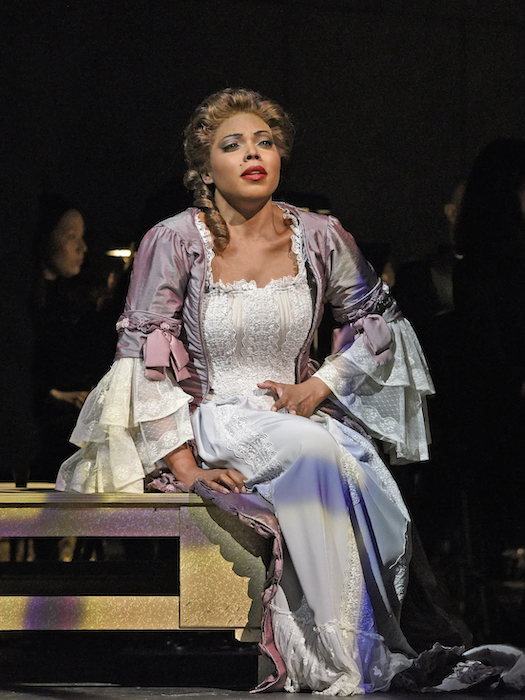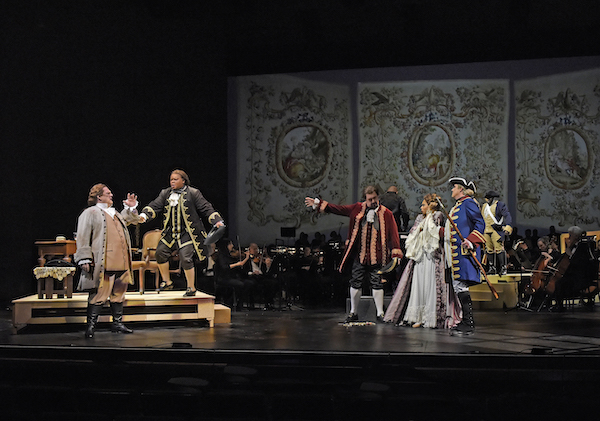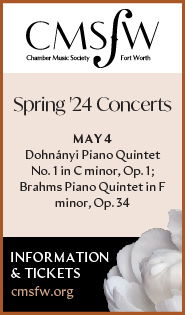Rising soprano Kristin Lewis brings star quality to Dallas Opera’s “Manon Lescaut”

Kristin Lewis sang the title role of Puccini’s “Manon Lescaut” in Dallas Opera’s semi-staged performance Friday night. Photo: Karen Almond
The final scene of Puccini’s Manon Lescaut finds Manon, the bedeviled heroine of the piece, lost and dying in the American wilderness; Friday night, in Dallas Opera’s semi-staged version at Winspear Opera House, that moment—and Manon’s aria “Sola, perduta, abbandonata”—crowned the Dallas debut of soprano Kristin Lewis, the newest star on the American operatic scene.
Lewis, a native of Little Rock, Arkansas, has in recent seasons built a career in major European houses, and made her debut at the Metropolitan Opera in January in the title role in Verdi’s Aida. Manon’s final moments in Friday’s performance provided the high point in a consistently impressive performance by Lewis as the conflicted, psychologically damaged heroine.
Besides a clear, distinctive, and richly textured vocal quality, Lewis owns a smooth range on both ends. As noted in the New York press, she hit a perfect high E-flat (an octave above the written note) in her Aida; in Friday’s performance, she landed effortlessly on the several high A and A-flats in an aria that opens in the lower soprano registers. She likewise understands the concept of adjusting tone quality for expressive purposes, and knows when to put an edge in her velvety spinto tone.
Typical of Puccini’s heroines, Manon is complex and motivated; drawn from Prévost’s eighteenth-century eponymous French novel, Manon journeys from innocence and gullibility to self-destructive hedonism to tragic regret in the course of the opera. But Lewis’s performance remains connected to all of those aspects of her character throughout. The score and libretto provide these elements, but it takes a great singing actress such as Lewis to bring this fluctuating ambiguity to life.

Photo: Karen Almond
The production, directed by Edward Berkeley, featured orchestra and chorus onstage, with fully costumed characters. The cast performed on a pair of platforms in front and a sloping ramp running between the cellos and the rest of the orchestra. The backdrop was a motionless projections of scenery, including classic artwork from the Dallas Museum of Art. This provided some intriguing insights for the seasoned operagoer, but apparently perplexed a few first-timers; one lady voiced a distaste for “all this modern stuff” opening night.
Tenor Gregory Kunde, last heard and seen at the Dallas Opera in Rossini’s Ermione in 2003, was dramatically powerful as Manon’s beloved Des Grieux, but proved incapable of dynamic control in the upper registers, leaning on a consistent forte and frequently covering Lewis in volume. Even in his first substantial aria, “Dio, quanto è bella,” Kunde’s persistently loud singing overshadowed the impetuous infatuation of Des Grieux’s first glance of Manon. The issue was even more problematic in the Act II duet, “Oh, sarò la più bella,” in which Kunde’s brash high notes simply failed to balance with Lewis’s perfectly managed tone in those characteristically Puccinian parallel rising passages.
Bass Andrea Silvestrelli’s appropriate gruffness of character as Manon’s aging sugar daddy Geronte unfortunately carried over into his vocal quality, with a disturbingly rough edge on his tone Friday night; baritone Musa Ngqungwana was convincingly hapless and greedy as Manon’s brother Lescaut, enlivening his role with smooth vocal control. Tenor Jonas Hacker brought liveliness and a clean, clear delivery to the role of Des Grieux’s companion Edmondo.
Tenor Matthew Grills turned the minor role of the Dancemaster into a scene-stealing triumph with over-the-top foppishness, blowing kisses at the conductor, caressing the harp, adjusting the music on the concertmaster’s stand, and viewing the proceedings with a condescending sneer—thus subtly underlining the flawed, foolish, and artificial behavior of Manon and Geronte at that point.
Conductor Emmanuel Villaume’s insight into the score matched Lewis’s performance in the title role. While Lewis’s greatest moment came in the final scene, Villaume’s arrived in the orchestral Intermezzo preceding Act III. Here, the sensitivity that characterized his reading of the entire score became even more evident in a segment that shifts rapidly from fiery passion to tenderness and arching lyricism.
Tommy Bourgeois’s period costumes were generally effective, although the dull beige and broad stretch of Des Grieux’s attire distractingly emphasized Kunde’s rotundity in a role that should represent youthful energy.
This was, ultimately, a Manon Lescaut for the vocal connoisseur, and a showcase for a dramatically and vocally impressive soprano who has only recently established her place on the international stage. Hopefully, we’ll see and hear more of Lewis in fully staged productions in the future, and witness more collaborations of this fast-rising singer with Emmanuel Villaume.
Manon Lescaut will be repeated 2 p.m. Sunday and 7:30 p.m. March 6 and 9 at Winspear Opera House. dallasopera.org



Posted Mar 04, 2019 at 8:52 am by Margaret Keith
She has been a star in Europe for a decade. We saw her twice in Vienna at Staatsoper and in Dresden—
She is fabulous
Posted Mar 04, 2019 at 1:48 pm by Angella Current-Felder
So proud of Kristin and her accomplishments. I’m looking forward to seeing her perform soon. I know her mother and sister are just beaming with pride.
Posted Mar 04, 2019 at 5:09 pm by Ara'Renee
This young lady she is a sweetheart best wishes on everything you are the best very professional very classy